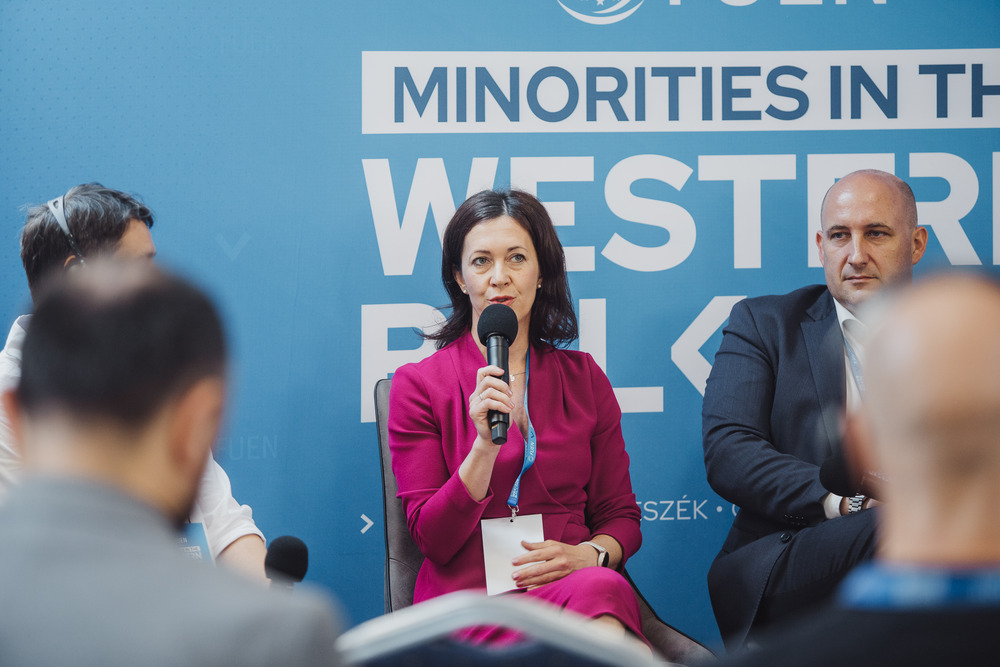
Minorities in the Western Balkans: FUEN’s presence is welcome and needed in the region
05.06.2023How good is the framework of minority rights in the countries in the Western Balkans and how well can minorities use these rights to preserve their identity, culture and language? FUEN’s Minorities in the Western Balkans conference proposed to answer these questions focusing on the areas of institutional models, education, political participation and discussing discrimination, and the debates showed that there is a great variance not only by countries, but between minorities living in the same country and even between members of the same community. „It is easy to be a Czech in Daruvar, but it is much harder in Zagreb or Osijek”, as one of the participants put it.
As the closing moment of the Minorities in the Western Balkans conference, organised on 2-4 June 2023 in Osijek·Essegg·Eszék, Croatia by the Federal Union of European Nationalities (FUEN) in cooperation with the Democratic Union of Hungarians of Croatia, the German Society – Organisation of Danube Swabians in Croatia and the Coordination Council and Representatives of the Czech National Minority, the participants adopted a Memorandum, in which they convene the following:
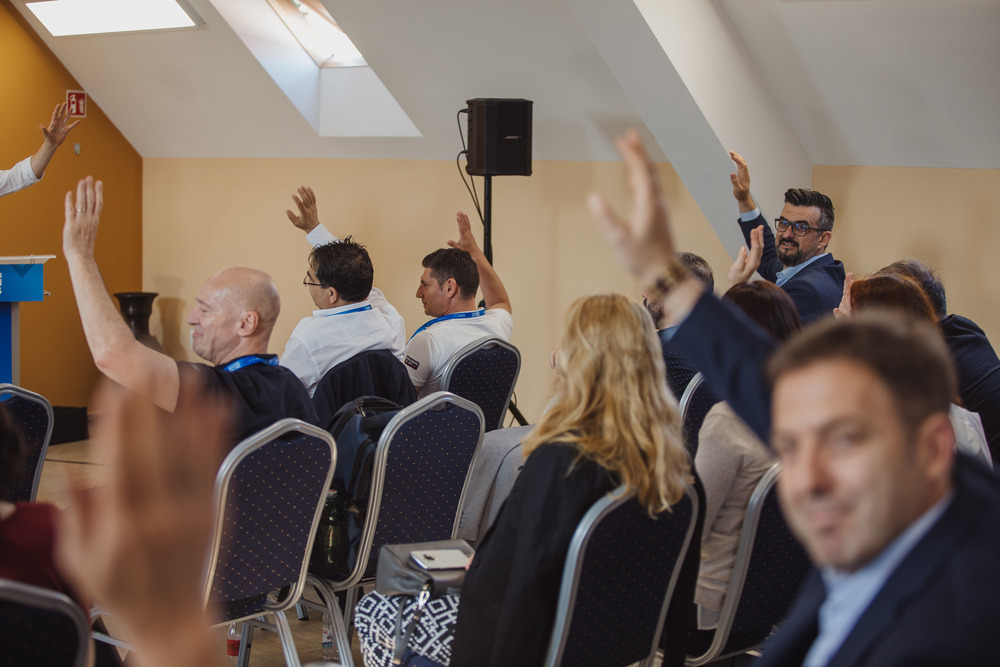
- “Coexistence based on mutual respect, bringing the majority and the minority closer together, appreciating and protecting the value of linguistic and cultural diversity of autochthonous minorities requires further efforts. In this effort member organisations count on the support and mediation role of FUEN.
- The participants of the Minorities in the Western Balkans Conference clearly state the need to strengthen the presence of FUEN as an umbrella organisation for minorities in this part of Europe.
- The accession of the countries of the region to the EU is an important goal for all minority communities; the conference participants are confident that legal guarantees for the protection of minorities will be strengthened in the accession negotiations.
- Combating hate speech is an objective for FUEN's member organisations in the Western Balkans which should be a priority in the coming years, using all possible means.
- The participants call for real solutions to the situation of the Roma minorities and for FUEN to continue to represent the interests of these communities at EU level. Antigypsyism, discrimination, and marginalization of Roma communities must be actively combatted and eliminated in Western Balkan countries in accordance with the active politics and measures of the European Union.
- Education in the mother tongue has been solved in many EU countries, but needs more attention in this part of Europe, so the participants call on FUEN to use its know-how to push for the development of public education policy strategies that can guarantee the survival of minority communities in the region.
- Ageing is affecting not only majority societies but also autochthonous minorities across Europe, so policy instruments should be identified to address the system of representation of minorities.”
Before this final act of the conference, aspects of minority life were vividly discussed in panel talks at the conference.
The first panel was an exchange of experiences regarding the different institutional models of the FUEN Member Organisations in Croatia. There are 22 recognised minorities in the country, and while the Croatian minority policy is exemplary – minorities are mentioned in the preamble of the Constitution and offered a wide range of rights in the framework of their cultural autonomy –, implementation is often lacking. Building up and maintaining own institutions might be a challenge – especially in the regions where the minorities live dispersed. Alongside the support of Croatia, the support from the kin-states is also an important factor in the institution-building. As far as challenges go, the representative of the Czech community enlisted the geographical dispersion and the lack of a youth organization, the German community faces a generational gap, the Serbs have to overcome the fear of being Serbs in Croatia, while the leader of the Hungarian community said that the greatest fear is that the state support will stop at one moment, and they do not have a safety net, international guarantees for a minimum of rights. „The certainty of our rights would be the greatest achievement”, as he put it.
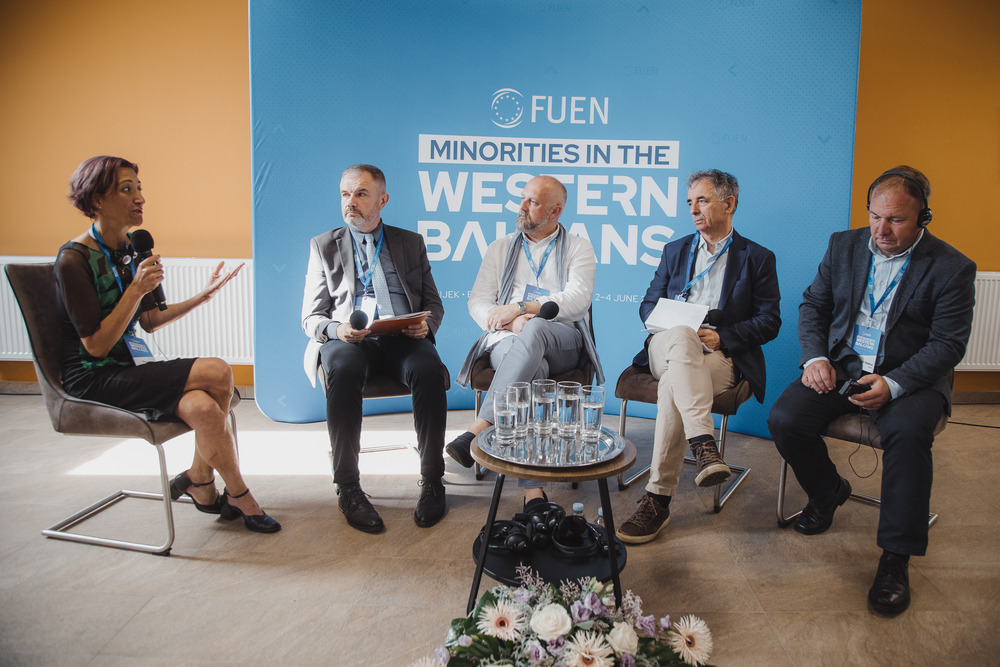
Towards sustainable minority institutions
Participants (from left to right): Moderator Zora Popova (FUEN), Róbert Jankovics, President of Democratic Alliance of Hungarians in Croatia, Vladimir Ham, President of German Society in Croatia, former FUEN Vice-President, Milorad Pupovac, MP Croatia, President of Serb National Council in Croatia, Damir Malina, president of Coordination Council and Representatives of the Czech National Minority in Croatia
The second panel focused on education, with the Croatian system of minority education presented first. It consists of three models (A, B, C) from primary school, with model A providing the full curriculum in mother tongue and model C providing 2-5 classes in minority language per week. It was interesting to see how different minorities use these models, with the Hungarians being the most consistent users of model A throughout the whole education cycle, and the popularity of Italian kindergartens and primary schools, which are attended by many Croatian children as well. North Macedonia, where more than 40% of the population belongs to a minority, also has a comprehensive minority framework, even if there is still much to be done in this regard, especially for the Roma community. They face shortcomings in the funding of schools, covert discrimination, but also problems with speaking and writing Roma language, as its standardization has begun not long ago in the country. The role of active local authorities was also mentioned, as is the case in Kmanovo, an example of successful Roma integration. A long-term partner of FUEN, the Network of Associations of Local Authorities in South-Eastern Europe (NALAS) presented its many projects impacting minorities, including the Social Dialogue Forum and the Minority Commissioner’s office in Bijeljina, Bosnia and Herzegovina – projects in which FUEN was an active partner.
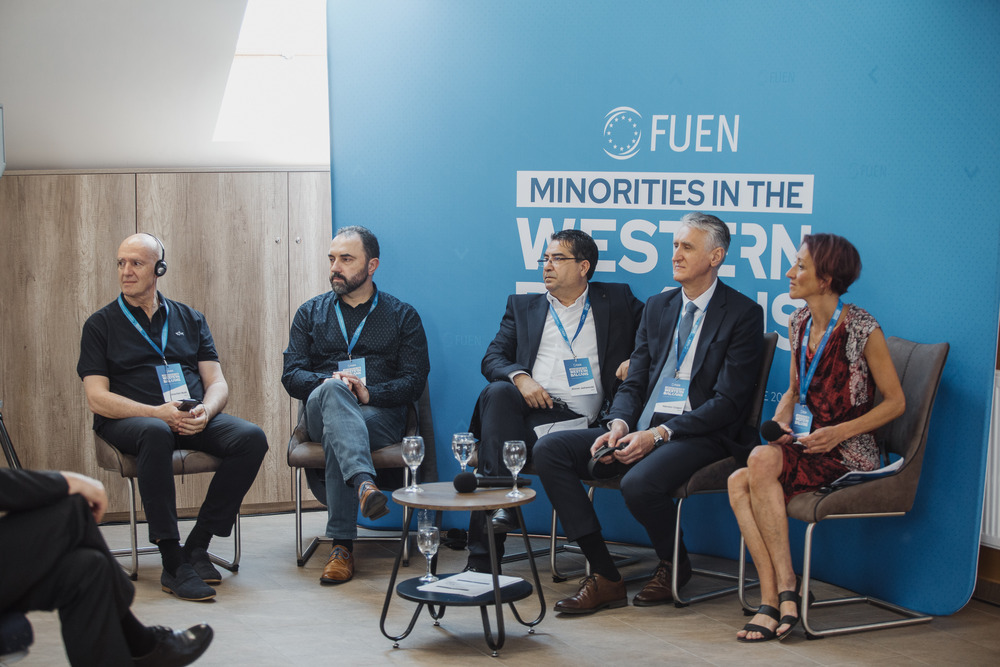
Minorities in education – between assimilation and integration
Participants (from left to right): Joachim Roth, EU Officer - NALAS - Network of Associations of Local Authorities of South East Europe, Boran Ivanovski, Program Officer - NALAS - Network of Associations of Local Authorities, Ahmet Jasharevski, Chairman Roma Community Center “DROM”, Nándor Csapó, Director of the Directorate for National Minorities, Ministry of Education – Croatia, Moderator Zora Popova (FUEN)
A panel on the political participation of minorities offered a view on how minority groups are represented at the state and local level in Croatia (where they have 8 representatives of minorities elected in a separate election unit, and they also have deputy county prefect seats reserved) and Kosovo (where out of the 120 seats in the Assembly 10 are for Serbs and 10 for other minorities), but also took an interesting detour when discussing the role of women in politics. Challenges were also tackled, such as minorities being unaware of the importance of local elections and missing out on the opportunity to be involved in the decision-making process, the problems with minority rights being linked to statistical numbers, censuses, and the decision of the Serbian minority in Kosovo to boycott the elections, and the consequences of losing its political representation on local level was also discussed.
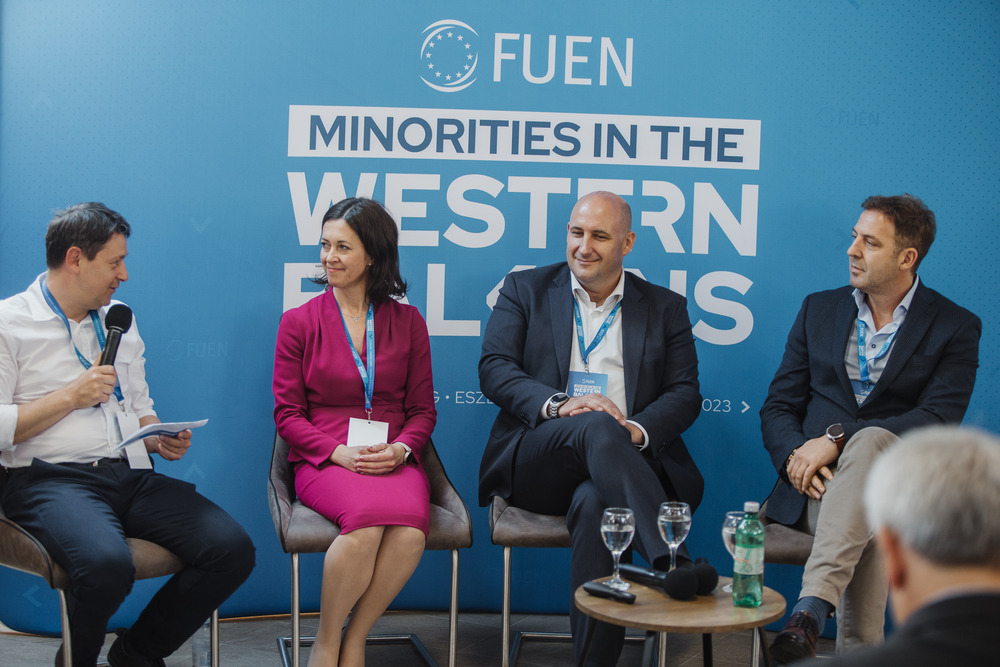
Political participation of minorities in the Western Balkans
Participants (from left to right): Moderator László Bodor (FUEN), Tanja Novotni Golubić, Deputy County Prefect of Bjelovar- Bilogora County for Czech national minority, Vladimir Bilek, MP, Deputy Club of national minorities of the Croatian Parliament, Member of the Committee on Human and National Minority Rights, Adrian Zeqiri, Executive Director, European Centre for Minority Issues Kosovo
Roma are Europeans, but they are not treated as such – was one of the conclusions of the last panel. Although the phenomenon of antigypsyism is not new, there are still no well-developed tools to tackle the problems and damages that it causes to people and their everyday life. Strategies are many, but the implementation is lacking, and documents are not enough when action is needed. The participants of the panel agreed that a major shortfall of the efforts aiming at combating antigypsyism is the lack of policies and measures targeting the mainstream population.
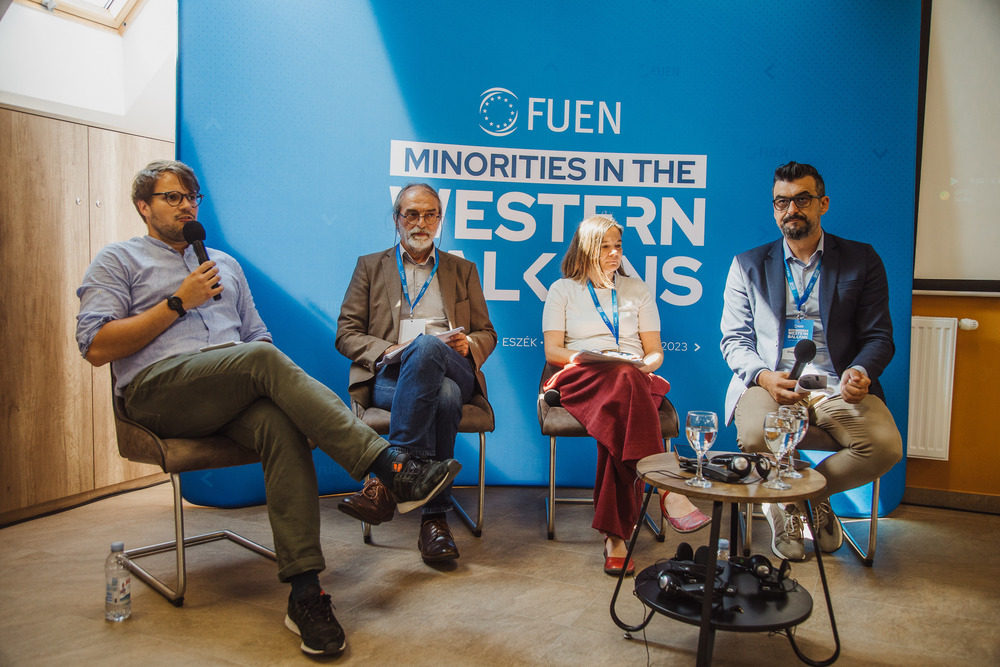
Antigypsyism, nationalism, discrimination, hate speech – how to act against it?
Participants (from left to right): Moderator Matic Germovsek (FUEN), • Aleksa Đokić, Head of Service for the Rights of National Minorities at the Office for Human Rights and Rights of National Minorities, Tatjana Vlašić, Deputy Ombudswoman for Human Rights, Dragan Joković, chair of Otaharin – Centre for Integrative Inclusion of Roma Men and Women
The conference ended with a guided tour of Osijek·Essegg·Eszék.
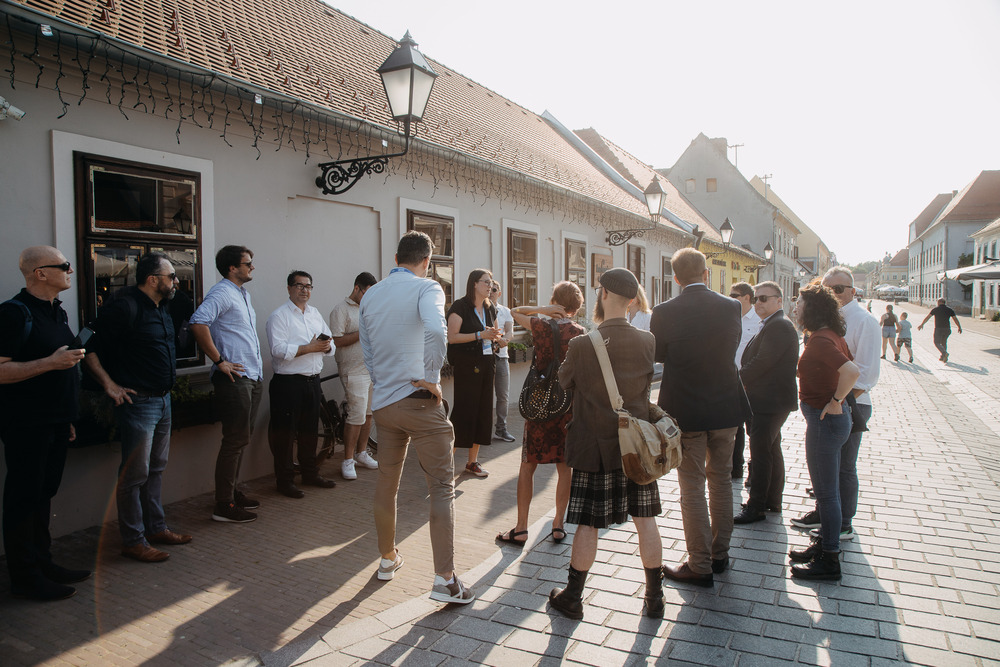
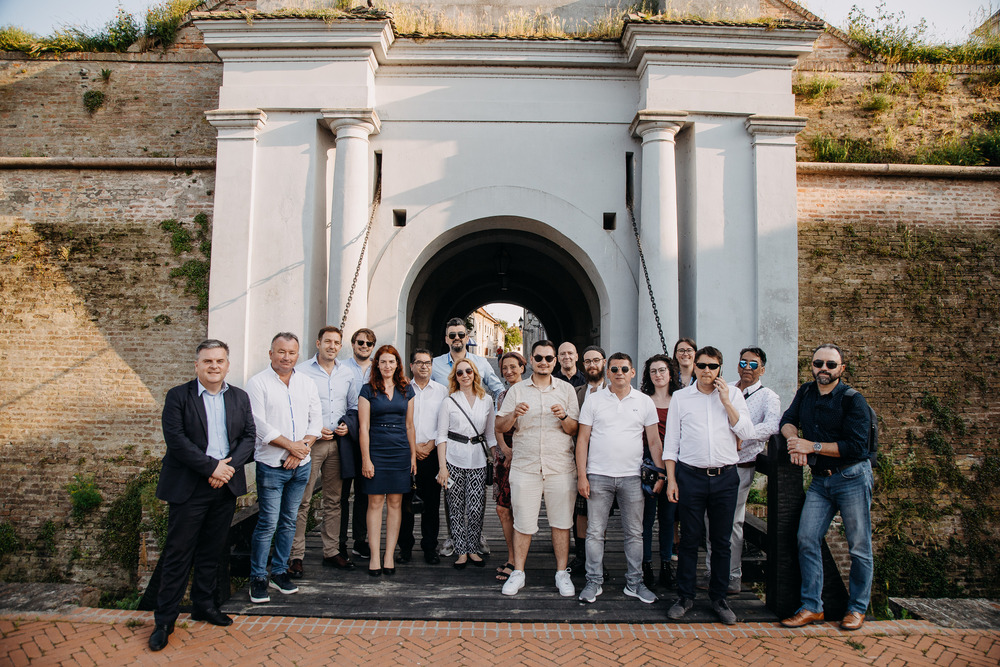
Pressemeddelelser
- FUEN wishes you a peaceful Christmas season, restful days and a bright, hopeful start to the new year!
- FUEN calls on the EU to act over systematic ethnic-based land confiscations in Slovakia
- Women of Minorities conference in Budapest calls for structural change to ensure equal political participation of minority women
- FUEN President Olivia Schubert at UN Forum on Minority Issues in Geneva
- "Laboratory of Peace": 28th Seminar of Slavic Minorities held in European Capital of Culture Gorica/Gorizia
- Equality in Political Participation and Representation: Third “Women of Minorities” Conference to Be Held in Budapest
- FUEN Working Group on Education discusses challenges and future of minority schooling in Europe
- 28th Seminar of Slavic Minorities in Europe to take place in Gorica/Gorizia, Italy
- Olivia Schubert in her first interview as FUEN President
- FUEN Assembly of Delegates elects new leadership – Olivia Schubert becomes new President














